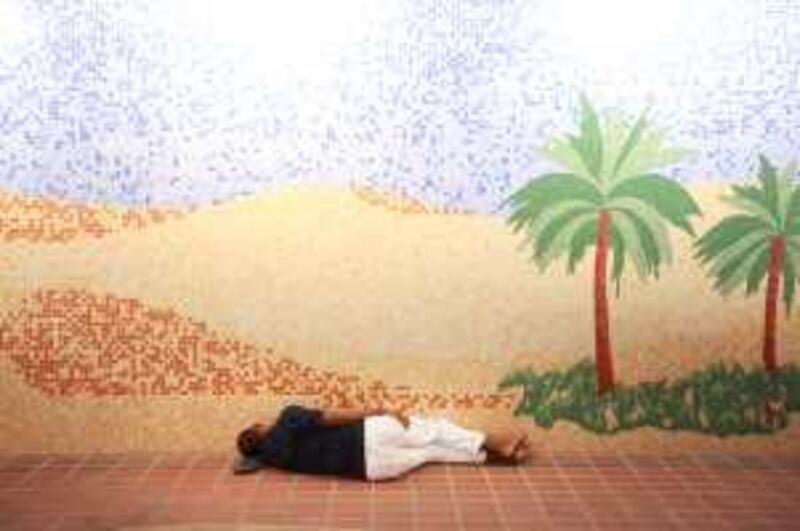ABU DHABI // By day, the Corniche attracts many visitors, residents and tourists alike, who like nothing more than a pleasant stroll by the glittering waters encircling the city. At night, however, a different group of people, mostly labourers, can be found along the walkway. They are there to sleep.
At 5am, little can be heard along the seafront except the occasional burst of music from mobile phones. The tinny melodies are usually alarms, rousing the men on the benches dotted along the shore from their slumbers. They are not homeless nor jobless. Almost all of these rough sleepers work, although many are paid very little. The majority have accommodation elsewhere but choose to bed down there. One said he had come for an early morning walk and simply fell asleep. Others said they were landscapers on night duty.
People seek shelter elsewhere in the city, too. The Bangladeshi worker, for example, who was trying to sleep on a makeshift pillow in an underpass, facing a tiled mural of a sunny beach scene.He said he had missed the company bus home the previous evening. With no money for a taxi, or a phone to call someone to pick him up, he simply lay down beneath the image of a palm tree and sand dunes and waited for morning.
Another man slept on a wooden bench in a dark corner of the Corniche. He had no visible possessions except a plastic bag containing a few documents. He said he had driven to the capital from Sila, 350km away in Al Gharbia, and would embark on the long drive back as soon as dawn broke. "I came to the mosque for my Azan prayers and then decided to lie down on a bench. I'll take a walk before going back," said the man, who declined to be named.
Anil Kumar and Venk Laxman, two street cleaners who have been working at the Corniche for about a year, said they often saw men arriving to sleep on the benches, usually from about 1am. By daybreak, however, there is little sign of them. "Around summertime, their numbers increase," Mr Kumar said. "Now, you won't find that many but they still come." He said he and his colleague did not to disturb the men or question them. That was not part of their job, he said.
He said the men slept right along the front. "From here, all the way to the Meena port. They take up positions everywhere." However, Mr Kumar said they were not regular rough sleepers, adding that he saw different people each night. A senior police officer who spoke on condition of anonymity acknowledged that people were sleeping in public. "People who live in Musaffah come to the city and don't bother going back. Instead, they sleep in public places on the island. They have homes but they still sleep near mosques, public parks and next to walls."
Last year, the police launched a campaign to curb sleeping in public and the officer said progress had been made. He noted that while it was not a criminal offence, sleeping rough was not allowed. "When we catch [people] sleeping in public, they are fined by the municipality. These individuals damage the public appearance of the city. It is the sponsor's duty to provide accommodation for their employees," he said.
However, the officer added, if a person caught sleeping on the street was drunk, or found to be an illegal immigrant, "their case is then referred to the Public Prosecution and then to the court". A spokeswoman for the municipality added that it "sends out inspectors regularly and they look for suspicious things, like people sleeping in public". Although inspectors usually work during office hours, "there are times when they go out at random hours of the day", she said. However, she was unable to confirm whether inspectors operated at night.
"As protocol, the inspector will take the identification of those sleeping in public and issue them a fine for Dh50 (US$14). "The person will be required to come to the municipality and go to a small claims court, where he pays the fine. He has to show a receipt of payment in order to get his identification back," the spokeswoman said. Jyotish Jacob, who works with the Valley of Love, an organisation for labourers, said he had heard of men sleeping on the Corniche, but had not seen them personally.
"If they do exist, then we can offer them alternate housing options," he said. David Blinco, an Australian construction manager living in Abu Dhabi, said he took an early morning walk every day and always saw people asleep on the Corniche. Having grown up in Brisbane, Mr Blinco said he recognised the difference between the homelessness in Australia and the men sleeping outside in Abu Dhabi. "There are no permanent cardboard boxes, which is what you typically see in Brisbane. They mostly sleep on the benches right on the Corniche where there is little light," Mr Blinco said.
He added that while most people ignored the men, he and his wife, Amy, planned to start providing food for some of them. Mr Blinco said he thought people slept rough in the city because "most of them have no other option and no one to turn to". "It doesn't shock me. It saddens me." myoussef@thenational.ae sbhattacharya@thenational.ae * With additional reporting by Hassan Hassan






